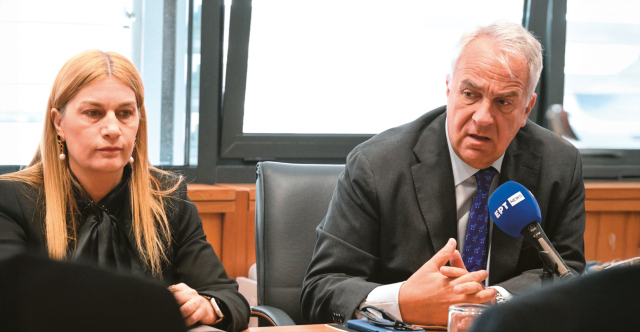The leadership of the European Union is set to enhance its powers and collaboration in order to confront illegal immigration decisively.
The new deportation framework introduced by the European Commission for Migration and Home Affairs mirrors existing policies from the Greek government. This plan, developed with input from the Minister for Migration and Asylum, Makis Voridis, includes measures such as forced deportations, detaining illegal immigrants for up to two years, incentives for voluntary departures, and penalties for third countries that refuse to accept their nationals found in Europe.
This initiative marks Europe’s concerted effort to rectify long-standing issues in its immigration strategy and mitigate the severe social, economic, and political fallout from illegal immigration. Current statistics reveal a stark reality: only 20% of illegal immigrants are deported.
Reversing these figures underscores the severity of the issue: 80% of the thousands of illegal immigrants entering Europe daily remain in the region permanently and move freely among member states, taking advantage of a fragmented and ineffective asylum management system.
Incentives for Departures and Forced Deportation
Mr. Voridis will present the EU’s new plan to the parliamentary committee this Tuesday. Sources indicate the proposed measures aim to resolve significant dysfunctions by establishing a unified, mandatory framework for all member states, addressing the imbalance between inflows of illegal immigrants and deportations. Central to the new approach is the principle advocated by the Greek minister: “Those who are not entitled to asylum are illegal and must be repatriated.”
The system seeks to bolster voluntary departures through incentives, while clearly communicating that non-cooperation will lead to detention and forced deportation. Proposed incentives include financial assistance for voluntary departure, which would be significantly less costly than remaining in member states.
For individuals who refuse facilitated departure options, destroy their travel documents, flee to another member state, or present security risks, forced returns will be mandated. Non-compliance may trigger a range of escalating measures, such as the reduction or removal of benefits, confiscation of identity documents, and mandatory reporting to authorities every three days. Detentions in closed centers for up to 24 months will be enforced for those who pose a flight risk or security threat (increased from the current 18 months).
Deportation Across the EU
A notable innovation in the proposed regulation is the mutual recognition of return decisions via a European return order. Initially, this order will permit EU member states to automatically recognize return decisions made by another member state without additional procedures (mandatory acceptance will come into effect after the first year). Consequently, a deportation order issued in Greece, for example, will apply across the entire EU.
The European return order, detailing essential elements of the return decision, will be uploaded to the Schengen Information System, serving as a shared database. This aims to enhance the effectiveness of return decisions throughout the EU and deter individuals from fleeing to other member states, as such moves will no longer improve their chances of remaining in the EU. Increased compliance is anticipated, along with encouragement for individuals to cooperate and return to their countries of origin.
Collaboration with Countries of Origin
Effective operation of the new mechanism hinges on the cooperation of the countries of origin for illegal immigrants. The European committee will continuously assess whether nations like Afghanistan, Syria, Pakistan, and others adequately accept readmission requests under existing bilateral or multilateral agreements. Non-compliance may lead to visa restrictions, with proposals for stronger sanctions under consideration.
Return Centers
Additionally, several European governments are exploring drastic measures by proposing to incentivize third countries to establish return centers within their borders. These centers would be designated exclusively for illegal immigrants with final return decisions, excluding families and unaccompanied minors.
Ask me anything
Explore related questions

















